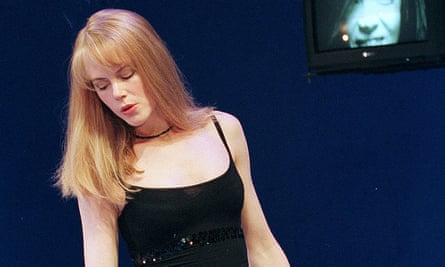Do you worship at the altar of Cate Blanchett or kiss a framed photo of Jake Gyllenhaal each night before bed? Do you obsess over the eyebrows of Rachel Weisz or the biceps of her husband, Daniel Craig? Do you thrill to the high baritone of Josh Groban or the growls of Liev Schreiber? Then you’re in luck this Broadway season. Actually you’re in luck most Broadway seasons, as Hollywood stars and pop crooners continue to get above-the-title billing off-Broadway and on.
Is this a good thing for theater? Well, that depends on your criteria. Certainly, it brings people in who otherwise might not attend and gives Broadway a welcome shot of the glamour it can sometimes lack, making the lights of the Great White Way glow more brightly. But too often celebrity casting seems a cheap ploy to increase box office totals and keep the publicity machine churning. These actors drum up excitement for new plays and goose otherwise bland-seeming revivals.
To look at lists of Tony award winners and nominees past is to see that Broadway and Hollywood have had a mutually supportive relationship for several decades, with film actors taking on the occasional play and Broadway sending its luminaries west. Many actors – like Blanchett and Schreiber – move between theater’s relative exteriority and film’s greater interiority with ease. Others don’t and their work doesn’t serve the play or burnish a reputation. Too often producers seem so eager to attract a bold-face name that they stop worrying about niceties like whether an actor is right for the role, whether she really wants it, whether he can pull it off.
Last year, for example, there were plenty of articles about celebrity “snubs” during Tonys time, the fact that the likes of Bruce Willis, Clive Owen, Keira Knightley, Forest Whitaker, Linda Lavin, Matthew Broderick, James Earl Jones, Jim Parsons, Jesse Tyler Ferguson and Jennifer Hudson were not honored. With a few exceptions, these weren’t so much deliberate brush-offs as pragmatic announcements that the performances – some disastrous, some respectable – had fallen rather short of virtuosic. When the nominees were announced, Hudson wrote and then removed an embittered tweet reading: “I was used for my celebrity not my talent.” And this was mostly true. Hudson was an odd fit to play the forthrightly sexual Shug Avery; she might have made a fine Sofia. Whitaker seemed similarly out of place as a slick gambler.

Sometimes even when the casting is spot on, the use of a celebrity still doesn’t work. Having stepped away from the stage for so long, Willis, as the persecuted writer of Misery, and Pacino, as the mercenary entrepreneur of China Doll, both apparently had trouble learning their lines. (In Pacino’s case, this was apparently exacerbated by frequent script changes.) Pacino, a multiple Tony winner, countered by flailing around the stage, calling on a series of verbal and physical tics and quirks rather than anything like a coherent character. Willis, by contrast, barely seemed to show up to the performance at all, disappearing into his hospital bed as an earpiece offered him his lines.
Knightley was more or less appropriately cast as the title character of Therese Raquin, a stifled wife who conspires with her lover, and she knew her lines. But she seemed to be applying filmic techniques to the theater, doing the sort of interior work that a cinematographer might have caught, but which was almost invisible, even to those in the first several rows. Other actors were abler (Broderick, Ferguson, Parsons, Jones), but brought something less than the charm and intensity of their onscreen work. It was hard not to imagine that somewhere in New York lurked an underpaid theater actor who might have done the job rather better. And let’s not forget that while famous actors were muddling through, the relative unknowns of Hamilton and The Humans were tearing up the stage nightly.
Still, there’s no denying the excitement when celebrity casting works. Who else would you want to play the Queen, but Helen Mirren, who won the Tony for that role a few years ago for The Audience? (Of course Mirren benefits from rigorous training and a varied stage career.) And Denzel Washington’s muffled charisma lent a particular poignancy to Fences.

Even when the casting doesn’t really work, there can be certain compensations. Theater is an erotic space, one in which beauty, allure and the charisma that precedes stars into a room are hardly detriments. This is sometimes distracting – Ewan McGregor’s good looks and easy charm seemed to work against his portrayal of an emotionally stymied playwright in the revival of The Real Thing two seasons ago. But sometimes it’s wonderful. Rather than wondering why last season’s Old Times had an iceberg in the center of its living room set, it was much nicer to look at Owen in his beautiful suit. And I know a couple of male colleagues who will cite Nicole Kidman’s Blue Room and Catherine Zeta-Jones’s A Little Night Music as career theatergoing highlights, regard which has little to do with the overall quality of those productions.
The first celebrity performance of this season, Diane Lane’s moony, melodramatic Ranevskaya in the Cherry Orchard revival, was a triumph of costuming and little else. It’s still too early to know how the rest of the current crop will fare, but enough charm, enough thrill, enough splendor and enough leg and what they do onstage might not really matter.

Comments (…)
Sign in or create your Guardian account to join the discussion